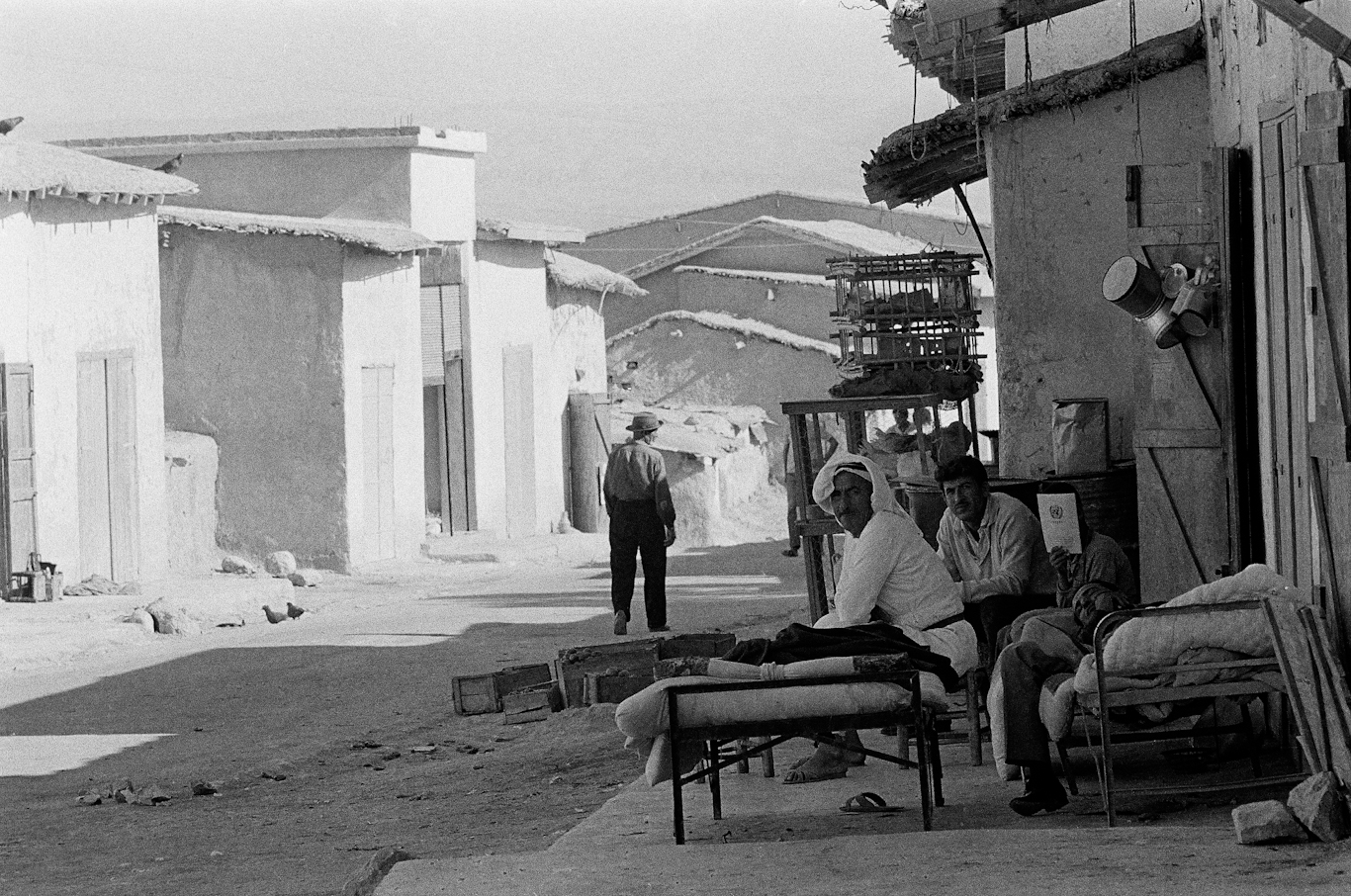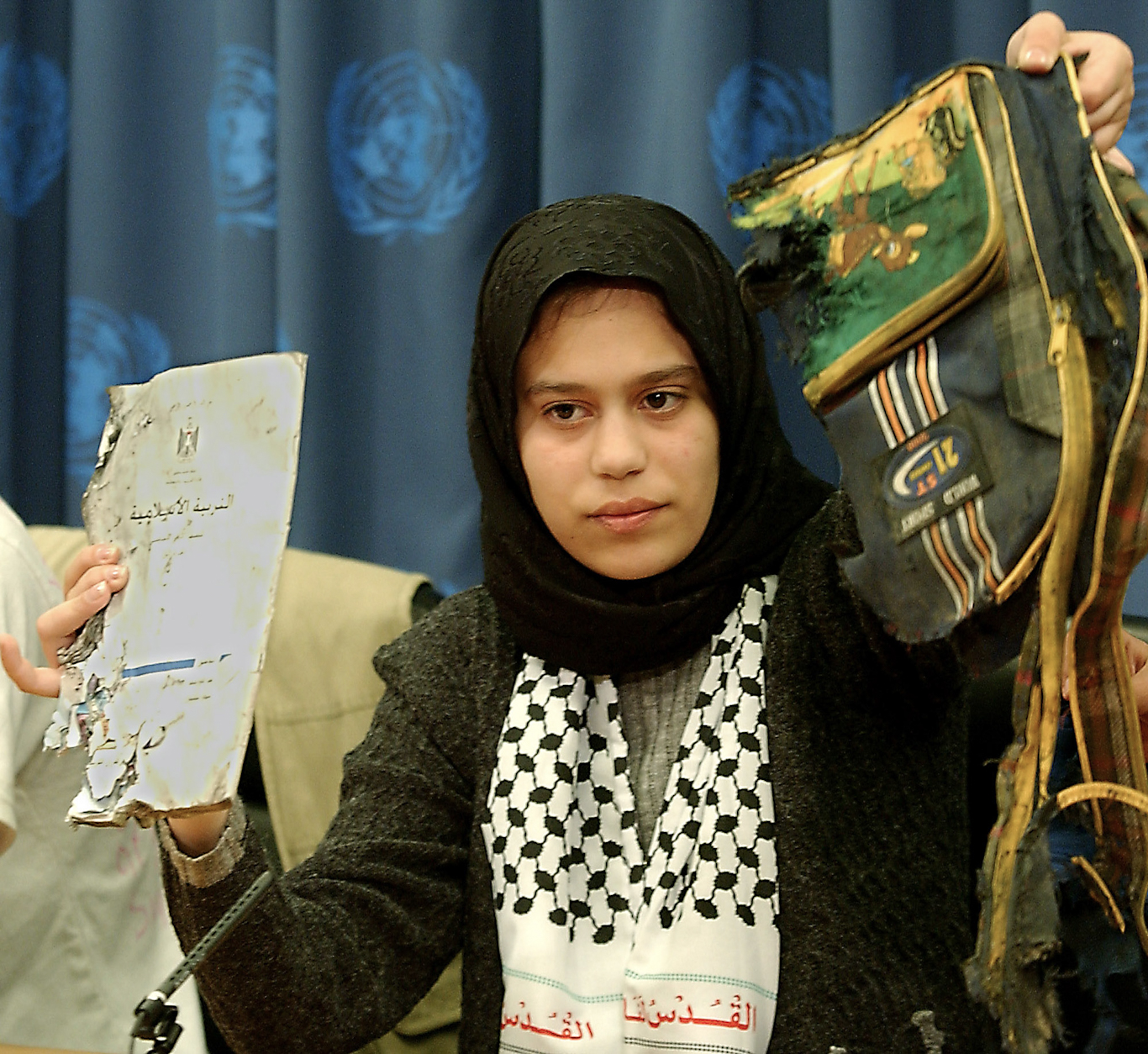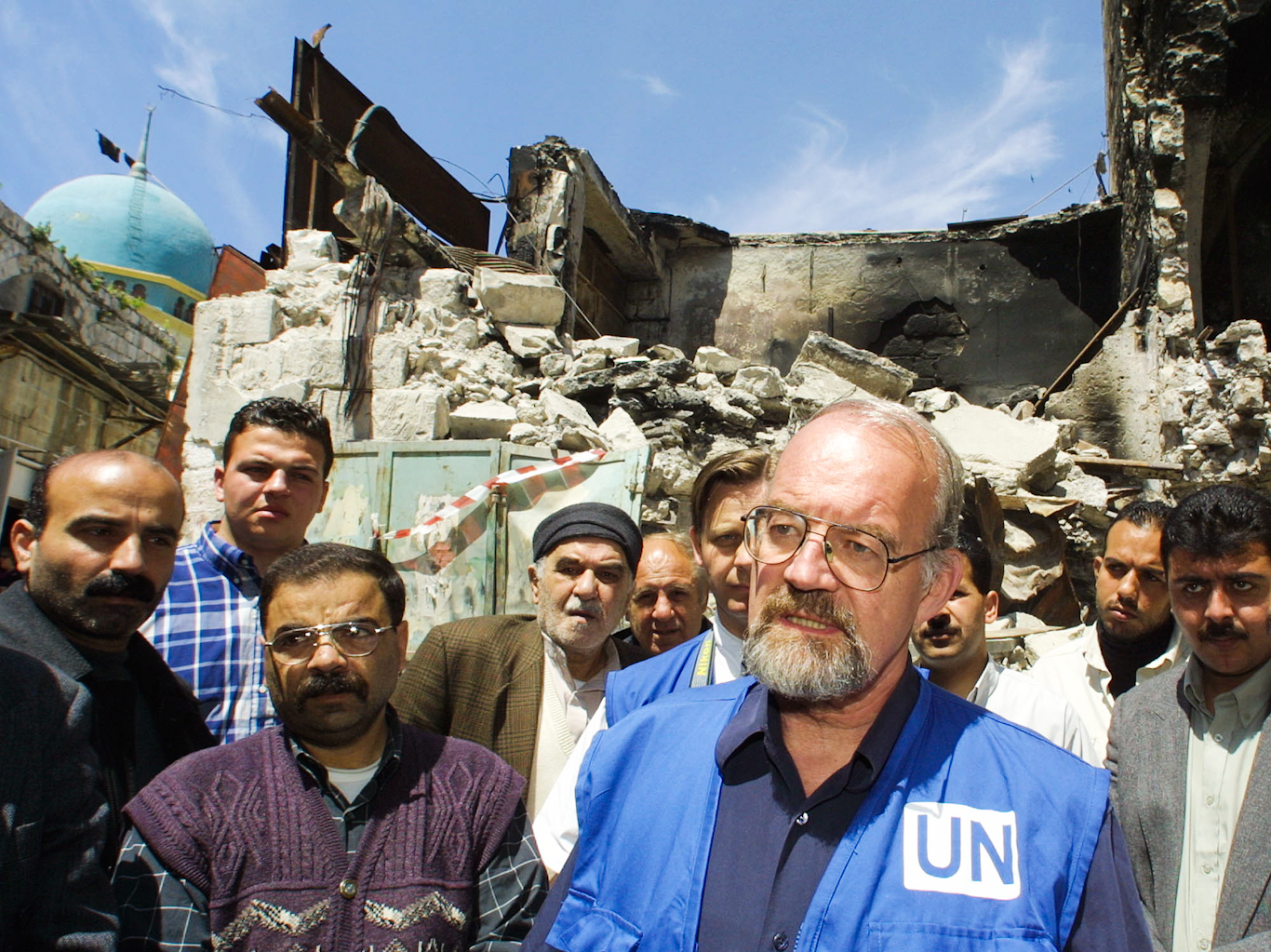The U.S. government is in a love affair with Israel, and nowhere is it more apparent than in the halls of the United Nations. Former U.S. Ambassador to the UN Nikki Haley once asserted, “Nowhere has the UN’s failure been more consistent and more outrageous than its bias against our close ally Israel.”
Indeed, since 1949, that state has been the subject of many hundreds of United Nations General Assembly (General Assembly) resolutions – nearly every one of them critical of Israel, “the Occupying Power.” Each year the General Assembly agenda includes a dozen or more discussions about Israeli injustice toward Palestinians, but rarely the reverse.
Many Israel supporters agree with Haley that this indicates an anti-Israel or even anti-Semitic tendency in the UN. The Anti-Defamation League (ADL) suggests that “Arab member states of the UN have used the General Assembly (GA) as a forum for isolating and chastising Israel.” The ADL speculates that “third-world nations” add their votes to those of hostile Arab states to pass measures against Israel.
This analysis is both implausible and ahistorical.
The UN agenda
Subjects matter in the General Assembly emerge not from personal animus, but the priorities of the UN and geopolitical facts. The UN strives to promote economic growth, maintain peace, support developing countries, and promote human rights, justice, and international law. The items on the General Assembly agenda involve complex issues. Most topics are automatically revisited every year until they are resolved; occasionally, a new one is added, or one is dropped or merged with another.
Resolutions grow not from hearsay or opinion, but from fact-based eyewitness reports, many of them UN-commissioned. Experts and members of UN committees regularly contribute carefully researched reports. Starting in the late 1960s, for example, the UN passed resolutions concerning South Africa, calling for an end to apartheid and encouraging all justice-loving countries to boycott, sanction, and isolate the country. UN member states overwhelmingly supported the efforts to end apartheid – not from an anti-South-African bias, but from a passion for justice. The topic: Policies of Apartheid of the Government of South Africa, came up year after year until 1994 when the issue was resolved.
Israel, on the other hand, has not made any of the changes the international community has called for. While it’s not surprising that Arab countries support Palestine in the UN, they are not numerous enough to accomplish anything on their own. Member States from all over the world vote in favor of resolutions that censure Israel – delegates look at facts and recommendations and decide whether they are compelling.
The fact that General Assembly passes a dozen or more resolutions addressing the Palestinian issue each year owes not to a bias against Israel (or Jews), but to the enormous scale and long history of the problem. The Palestinian plight has been before the organization for decades and has grown in scope – not just because the number of Palestinians has grown, but because Israel’s brutality has intensified.
It is worth taking time to trace the roots of the General Assembly’s supposed preoccupation with Palestine and determine whether it is malicious or constructive.
1948 refugees and UNRWA
At least 750,000 Palestinians fled or were exiled from their homes and villages as the state of Israel emerged in 1948 on 78 percent of historic Palestine. The UN passed a resolution expressing its expectation that the refugees would be allowed to return. Israel refused to comply.
In 1949, the UN created UNRWA, the United Nations Relief and Works Agency for Palestine Refugees in the Near East, and gave it the mandate to care for those refugees and help them return home. And because the Palestinian refugees from 1948 are still in exile, UNRWA is still at work, providing health care, education, and social services to the refugee population of the Palestinian territories.
Every year since 1952, UNRWA has reported to General Assembly on its work, and has been commissioned via resolution to continue its efforts – that’s 67 resolutions in 67 years while waiting for Israel to grant the refugees their right of return. Every year, some Palestinians leave the refugee camps and emigrate to countries around the world, but the majority stay, either because they can’t afford to leave, or in hopes of returning home. The number of refugees has grown from 750,000 to around 3 million – and the costs to UNRWA have increased exponentially.
In 1970, the General Assembly created the Working Group on the Financing of UNRWA to address the Agency’s financial crisis. Every year since, the Working Group has pursued new ways to finance UNRWA’s work, and produced a report on its efforts; every year, the UN passes a resolution for the continuation of those efforts – 49 years, 49 resolutions.
1967 refugees
About 200,000 Palestinians were displaced during the so-called Six-Day War in June of 1967 (some of these had already been displaced in 1948) when Israel occupied what was left of Palestine. Again, Israel refuses to let them return.
In 1983, General Assembly began addressing this issue individually, demanding that not just the refugees from 1948, but also those from 1967, be allowed to return. Because Israel has steadfastly refused to give them this right, the topic: Persons Displaced as a Result of the June 1967 and Subsequent Hostilities, has prompted resolutions every year since 1975 – 44 years in a row.

Displaced by the Six Day War, Refugees wait for food rations from UNRWA in an almost deserted refugee camp near Jericho, Feb. 6, 1968. Photo | AP
Settlements: land theft
As soon as Israel began its occupation in 1967, it began to build settlements – pockets of Israeli citizens living illegally on Palestinian land. In yet another affront to justice and international law, settlement construction includes the demolition of entire Palestinian villages, the confiscation of Palestinian property, and the expulsion of Palestinians.
By 1972, the Special Committee to Investigate Israeli Practices Affecting the Human Rights of the Population of the Occupied Territories had brought this to the attention of the General Assembly, which began tracking Israel’s settlement-building and passing resolutions condemning the practice, asking the Special Committee to follow up – 47 resolutions in 47 years. (Until 2019, the United States agreed with the rest of the world that these settlements are illegal.)
Because Israel has persistently ignored the UN’s demands, at least 600,000 Israelis now live illegally in the Palestinian territories, including in East Jerusalem.
Human rights abuses
The UN Special Committee to Investigate Israeli Practices Affecting the Human Rights of the Palestinian People is also fighting for Palestinian rights. The committee was formed in 1968 to specifically address Israel’s violations of international humanitarian law and international human rights law that arose in the wake of the occupation.
Every year, the Committee conducts a fact-finding mission in the region, and every year, the Israeli government refuses to participate or even allow the members to enter the occupied Palestinian territories. Through investigation, independent research, and interviews with members of relevant UN committees and reputable NGOs, the Committee puts together a report in keeping with their mandate. Various groups use these reports to carry on advocacy work.
Every year since 1971, General Assembly has passed a resolution directing the Committee to continue its valuable work. That’s 48 resolutions in 48 years. (Here is the 2019 report.)
Inalienable rights
By 1975, the General Assembly was “gravely concerned” that Palestinian refugees still lacked their inalienable rights to self-determination, sovereignty, and the ability to return home. The body stated:
the United Nations has a permanent responsibility with respect to the question of Palestine until the question is resolved in all its aspects in a satisfactory manner in accordance with international legitimacy.
The General Assembly created the Committee on the Exercise of the Inalienable Rights of the Palestinian People in hopes of finding a solution.
Starting in 1976, and every year since, the Committee has worked with other organizations around the world that are advocating for a just solution. They have reported every year, and every year General Assembly has passed a resolution – 43 in total – recognizing the work and authorizing it to continue.

Reem Hassan holds items that belonged to a child killed by an Israeli landmine during a 2002 U.N. Children’s summit in New York. Stephen Chernin | AP
Self-determination
The UN Social, Humanitarian, and Cultural Committee has also taken on the Palestinian issue, with an emphasis on “the development of friendly relations among nations, based on respect for the principle of equal rights and self-determination of peoples.” This Committee has been working and reporting since 1995; each year, the General Assembly passes a resolution reaffirming these efforts: 24 resolutions in 24 years.
Stealing natural resources
Beginning in July 1996, General Assembly joined with the UN Economic and Social Commission for Western Asia to highlight (among other things) Israeli settlements’ devastating impact on Palestinians’ access to their own natural resources.
For years, Israel’s government and illegal settlers have been confiscating or destroying agricultural land and orchards, water pipelines and sewage networks, and diverting water resources from Palestinian towns to illegal settlements.
The Permanent Sovereignty over Natural Resources Committee tracks and reports these actions in an effort to hold Israel accountable for its exploitation and destruction of Palestinian natural resources.
Israel has refused to take appropriate action. The General Assembly has, therefore, continued to pass resolutions to keep the Committee on the job – 23 resolutions in 23 years.
The Holy City of Jerusalem
Ever since 1947, before the State of Israel was created on Palestinian land, Jerusalem has been a focal point of the United Nations. Resolution 181 declared,
The City of Jerusalem shall be established as a corpus separatum under a special international regime and shall be administered by the United Nations.
In support of Israel’s application for UN membership, the Israeli delegate Abba Eban assured the General Assembly that the Jewish state agreed with Resolution 181.
In the more than seventy years since, Israel never put the UN plan into motion. Israel controlled much of the city beginning in 1948 and officially – illegally – annexed the rest in 1980 – an act which the United Nations has deemed “null and void” (but which the current U.S. administration supports).
The topic of Jerusalem has come up in 38 General Assembly sessions and resolutions as the body has attempted again and again to pressure Israel to submit to international law and the UN’s own declarations – as well as Israel’s own promises.
Israel created an economic crisis
The Economic and Social Council of United Nations works with various UN bodies to identify “economic and social repercussions of the Israeli occupation on the living conditions of the Palestinian people,” and has been working for over four decades to coordinate and deliver needed assistance. Consequently, the topic of “Assistance to the Palestinian People” has spawned 40 resolutions.
United Nations as a myth-buster
As General Assembly saw, year after year, Israel’s impunity for egregious human rights violations, the body turned to the UN Department of Public Information (DPI) to ramp up the pressure. The DPI had been established in 1946, “to promote global awareness and understanding of the work of the United Nations …[to build] support for peace, development and human rights for all.
The General Assembly instructed DPI to build close contact with the media, organize conferences and meetings with NGOs, publish newsletters and articles, and organize trips for journalists “in order to heighten awareness of the facts relating to the question of Palestine.” Each year since 1996, General Assembly has passed resolutions renewing DPI’s mandate – 23 years in a row.
The effort may be paying off in the one country that stands most resolutely by the side of Israel: polls are beginning to indicate that Americans are becoming less supportive of Israel and of U.S. government policies that favor the “Jewish State.”

UNRWA’s Peter Hansen speaks to the media during a tour of Nablus following Israeli helicopter and tank attacks in 2002. Greg Baker | AP
Numbers speak volumes
Palestine has been a prominent UN topic since 1949 and has been the subject of at least seven hundred resolutions – only a fraction of which are discussed here.
The list of committees and working groups toiling over the Palestinian issue is long. General Assembly indeed spends a great deal of time discussing and debating this topic. Their work attests, not to an anti-Israel or anti-Semitic culture in the United Nations, but to the tenacity of this global body – and the shameless belligerence of Israel.
It also speaks volumes that the United States remains one of only a handful of allies of this rogue state. Until this changes, there is no reason to expect that Israel’s behavior will improve.
Feature photo | A United Nations aid agency car lies destroyed by shrapnel from an Israeli airstrike in the Jebaliya refugee camp, northern Gaza, July 29, 2014. Lefteris Pitarakis | AP
Kathryn Shihadah writes for MintPress News and If Americans Knew. She speaks regularly about the injustice and demonization Palestinians face at the hands of Israel with complicity from the United States, especially to Christian audiences. Kathryn has lived in the Middle East for ten years and has traveled extensively. She blogs at PalestineHome.org
The post Do Hundreds of UN Resolutions Prove the United Nations has an Anti-Israel Bias? appeared first on MintPress News.
